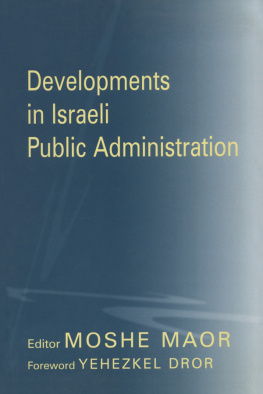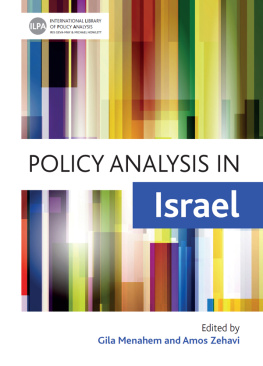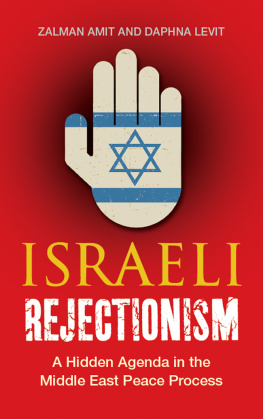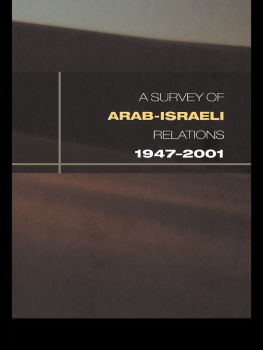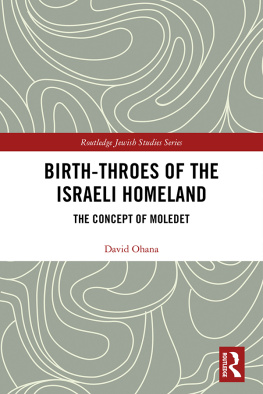DEVELOPMENTS IN ISRAELI PUBLIC ADMINISTRATION
ISRAELI HISTORY, POLITICS AND SOCIETY
Series Editor: Efraim Karsh, Kings College London
ISSN: 1368-4795
This series provides a multidisciplinary examination of all aspects of Israeli history, politics and society, and serves as a means of communication between the various communities interested in Israel: academics, policy-makers, practitioners, journalists and the informed public.
- Peace in the Middle East: The Challenge for Israel, edited by Efraim Karsh.
- The Shaping of Israeli Identity: Myth, Memory and Trauma, edited by Robert Wistrich and David Ohana.
- Between War and Peace: Dilemmas of Israeli Security, edited by Efraim Karsh.
- U.S.-Israeli Relations at the Crossroads, edited by Gabriel Sheffer.
- Revisiting the Yom Kippur War, edited by P. R. Kumaraswamy.
- Israel: The Dynamics of Change and Continuity, edited by David Levi-Faur, Gabriel Sheffer and David Vogel.
- In Search of Identity: Jewish Aspects in Israeli Culture, edited by Dan Urian and Efraim Karsh.
- Israel at the Polls, 1996, edited by Daniel J. Elazar and Shmuel Sandler.
- From Rabin to Netanyahu: Israels Troubled Agenda, edited by Efraim Karsh.
- Fabricating Israeli History: The New Historians, second revised edition, by Efraim Karsh.
- Divided Against Zion: Anti-Zionist Opposition in Britain to a Jewish State in Palestine, 1945-1948, by Rory Miller.
- Peacemaking in a Divided Society: Israel After Rabin, edited by Sasson Sofer.
- A Twenty-Year Retrospective of Egyptian-Israeli Relations: Peace in Spite of Everything, by Ephraim Dowek.
- Global Politics: Essays in Honour of David Vital, edited by Abraham Ben-Zvi and Aharon Klieman.
- Parties, Elections and Cleavages; Israel in Comparative and Theoretical Perspective, edited by Reuven Y. Hazan and Moshe Maor.
- Israel at the Polls 1999, edited by Daniel J. Elazar and M. Ben Mollov.
- Public Policy in Israel, edited by David Nachmias and Gila Menahem.
- Developments in Israeli Public Administration, edited by Moshe Maor.
Israel: The First Hundred Years (Mini Series), edited by Efraim Karsh.
- Israels Transition from Community to State, edited by Efraim Karsh.
- From War to Peace? edited by Efraim Karsh.
- Politics and Society Since 1948, edited by Efraim Karsh.
- Israel in the International Arena, edited by Efraim Karsh.
DEVELOPMENTS IN ISRAELI PUBLIC ADMINISTRATION
Edited by
Moshe Maor
Foreword by
Yehezkel Dror
First published in 2002 by
FRANK CASS PUBLISHERS
This edition published 2013 by Routledge
2 Park Square, Milton Park, Abingdon, Oxon OX14 4RN
711 Third Avenue, New York, NY 10017
Routledge is an imprint of the Taylor & Francis Group,
an informa business
Copyright 2002 Frank Cass & Co. Ltd
British Library Cataloguing in Publication Data
Developments in Israeli public administration. (Israeli history, politics and society; v. 18)
1. Public administration Israel 2. Israel Politics and government
I.Maor, Moshe
351.5694
ISBN 0 7146 5302 0 (cloth)
ISBN 0 7146 8263 2 (paper)
ISSN 1368-4795
Library of Congress Cataloging-in-Publication Data
Developments in Israeli public administration / edited by Moshe Maor.
p. cm. (Israeli history, politics, and society, ISSN 1368-4795; 18)
This group of studies first appeared as Developments in Israeli Public Administration, a special issue of Israel Affairs, Vol.8, No.4 (Summer, 2002).
Includes bibliographical references and index.
ISBN 0-7146-5302-0 (hardback) ISBN 0-7146-8263-2 (pbk.)
1. Public administrationIsrael. I. Maor, Moshe. II. Israel affairs.
Special issue. III. Series.
JQ1830.A58 D475 2002
351.5694dc21
2002004670
This group of studies first appeared as Developments in Israeli Public Administration, a special issue of Israel Affairs, Vol.8, No.4 (Summer 2002), published by Frank Cass and Co. Ltd
All rights reserved. No part of this publication may be reproduced, stored in or introduced into a retrieval system or transmitted in any form or by any means, electronic, mechanical, photocopying, recording or otherwise, without the prior written permission of the publishers of this book.
Yehezkel Dror
It is hard to imagine more compact and dense a social science laboratory than the State of Israel. Take a small area, throw into it waves of diverse immigrants, add rapid transitions between wars and peace, divide the population between various belief systems, introduce complex links with external groups and global cultures, subject the society to rapid transformations and you have what is both the State of Israel and a unique setting for studying complex processes in a small enough area to be comprehensible as a whole.
Regretfully, however much Israeli and other social scientists1 research the shifting realities of Israel, this is an underutilized laboratory. Thus, good books on Israeli governance are very scarce, even in Hebrew. All the more welcome is this collection, which explores some main aspects of the public administration of Israel in ways providing novel insights and comparative material for the study of public administration as an academic discipline and an applied profession.
To help to understand fully the various chapters and draw theoretical and comparative conclusions, some broader contextual perspectives may be useful. Let me suggest seven that may help to locate the various discussed subjects within a systemic view:
1. Israel is the most ideological of all contemporary democracies
While all states are similar in some respects and unique in others, Israel is radically unique among democracies in having a dominant ideology, namely Zionism. Thus, it should be born in mind that it was Zionism which produced the population basis of Israel, by encouraging immigration, this being a unique feature in comparison to other state-building ideologies.
However diluted and controversial, the vast majority of the Jewish population of Israel adheres to Zionism in the sense of wishing Israel to be a Jewish-Zionist state while also being a democracy. This imposes a double set of tasks on the government of Israel and its public administration, namely to engage in building the state and assuring its Jewish-Zionist future, while also serving the desires and needs of the present populations, including the nonJewish minorities. The tensions between those two sets of tasks serve to explain some of the features of Israels public administration within its governmental and political environments.
2. Social architecture is widely accepted as a governmental task
Let me further elaborate the aforementioned feature by emphasizing the social architecture tasks of the government, going far beyond welfare state models. Thus, in addition to immigration and its integration, the dispersal of populations, education that strengthens commitment to Jewish-Zionist values, and the integration of Israel with the Jewish People as a whole are among the social architecture tasks accepted by the vast majority of senior politicians, in addition to all the usual functions of government.
This further complicates the self-image and mission conceptions of the civil service, between serving the public and participating in societal valuedriven architecture.

